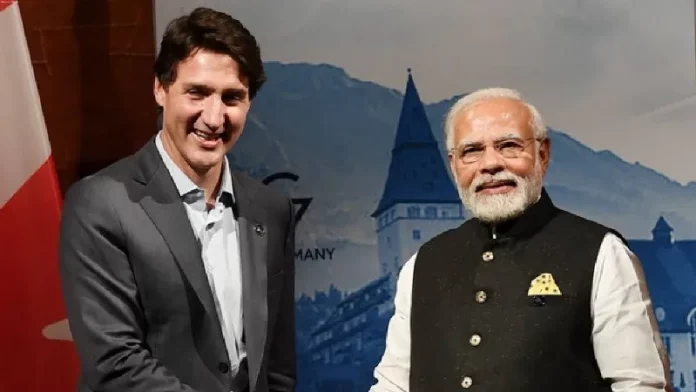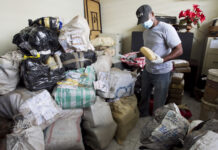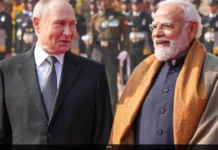NEW DELHI: Top sources have rejected claims made by Canadian Prime Minister Justin Trudeau and other officials about presenting “credible evidence” to India regarding the killing of Khalistani terrorist Hardeep Singh Nijjar. Sources said that Canada’s approach, since the beginning, has been to make “vague accusations” and put the burden of denial on India.
Sources further said that Trudeau, during the press conference was saying, “the same old things for the same old reasons.”
While addressing the press conference on Monday, Trudeau accused agents of the Indian government on Monday of engaging in “clandestine information-gathering techniques, coercive behaviour targeting Canadians, and involvement in threatening and violent acts.”
Sources said, “The central assertion from all Canadian officials is that credible evidence has been presented to India. This was also repeated by their Cd’A to the press. This is simply not true. From the very beginning, the Canadian approach has been to make vague accusations and put the burden of denial on India.”
According to Indian sources, no specifics regarding the connection of certain individuals to India were provided.
Sources said, “At the RCMP press briefing, assertions were made about connections of certain individuals to India. In no case were any specifics provided. There was also talk about holding people accountable. But it was never made clear who and for what.”
Sources termed it absurd that the Canadian government after intensively engaging the High Commissioner over the last year has now chosen to target him.
Citing evidence from the Royal Canadian Mounted Police (RCMP), Trudeau claimed that Indian government officials were involved in activities that pose threat to public safety.
“As the RCMP Commissioner stated earlier they have clear and compelling evidence that agents of the Government of India have engaged in and continue to engage in activities that pose a significant threat to public safety. This includes clandestine information-gathering techniques, coercive behaviour targeting South Asian Canadians, and involvement in a dozen threatening and violating acts, including murder. This is unacceptable,” Trudeau alleged while addressing the press conference.
He further claimed that Canadian law enforcement had “made several attempts” to work with Indian counterparts on these matters but were “repeatedly refused.”
“While attempts have been made by the RCMP and national security officials to work with the Government of India, and Indian law enforcement counterparts on this matter, they have been repeatedly refused. This is why, this weekend, Canadian officials took an extraordinary step – they met with Indian officials to share RCMP evidence, which concluded six agents of the Government of India are persons of interest in criminal activities. Despite repeated requests to the Government of India, it decided not to cooperate,” he claimed.
The diplomatic fallout comes after allegations by Royal Canadian Mounted Police (RCMP) Commissioner Mike Duheme, who claimed they have information on certain criminal activity carried out by agents of the Indian government.
“Over the past few years and more recently, law enforcement agencies in Canada have successfully investigated and charged a significant number of individuals for their direct involvement in homicides, extortions & other criminal acts of violence. In addition, there have been well over a dozen credible imminent threats to life which have led to the conduct of duty to warn, by law enforcement with members of South Asian community and specifically, members of the pro-Khalistan movement,” Duheme said.
The RCMP further claimed that investigations have revealed that Indian diplomats and consular officials based in Canada leveraged their official positions to engage in clandestine activities, such as collecting information for the Government of India, either directly or through their proxies; and other individuals who acted voluntarily or through coercion.
India on Monday expelled six Canadian diplomats hours after it summoned Canada’s Charge d’Affaires Stewart Wheeler and conveyed that the “baseless targeting” of the Indian High Commissioner and other diplomats and officials in Canada was completely unacceptable.
This move came after Canada expelled six Indian diplomats after police collected evidence they were part of an Indian government “campaign of violence,” news agency Reuters reported citing a Canadian government source earlier.
Earlier, on Monday, India “strongly” rejected a diplomatic communication from Canada suggesting that the Indian High Commissioner and other diplomats were “persons of interest” in an investigation and termed it as “preposterous imputations” and part of the political agenda of the Justin Trudeau government.
In a hard-hitting statement, India said Prime Minister Trudeau’s hostility to India has long been in evidence and his government has consciously provided space to violent extremists and terrorists “to harass, threaten and intimidate Indian diplomats and community leaders in Canada.”
The ties between India and Canada soured after Canadian Prime Minister Justin Trudeau, in a parliamentary address last year, claimed that he has “credible allegations” of India’s hand in the killing of Khalistani terrorist Hardeep Singh Nijjar, who was shot in Surrey in June last year. (ANI)
Also Read: India withdraws its envoy, other ‘targeted diplomats’ from Canada







